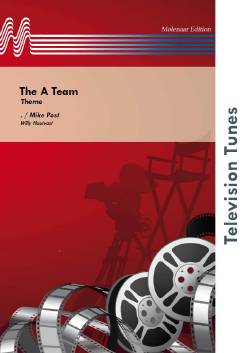Results
-
£26.50
The Rambler - Calvert, A
Includes a full band set (no score)
In Stock: Estimated dispatch 1-3 working days
-
£26.50
The Right Sort - Calvert, A
Includes a full band set (no score)
In Stock: Estimated dispatch 1-3 working days
-
£26.50
The Young Brigade - Calvert, A
Includes a full band set (no score)
In Stock: Estimated dispatch 1-3 working days
-
£72.99
The Rose - A. McBroom
Everybody knows this beautiful song by Amanda McBroom. Juri Briat has made an arrangement of The Rose in his own natural style.
Estimated dispatch 5-14 working days
-
£33.00
Batman The Movie (Theme) - Elfman, D - Catherall, A
From the 1989 Batman movie this piece by Danny Elfman has gone on to become iconic.Courtesy of World of Brass
In Stock: Estimated dispatch 1-3 working days
-
£30.00
HOLY CITY (THE) - A.Morrison
Estimated dispatch 7-14 working days
-
 £50.00
£50.00The A Team - Mike Post/Willy Hautvast
Estimated dispatch 10-14 working days
-
 £49.10
£49.10 -
 £108.10
£108.10Take the A Train - Billy Strayhorn
Estimated dispatch 5-14 working days
-
 £35.00
£35.00A Suffolk Prelude - Andrew Duncan
Written for the Ipswich & Norwich Co-Op Band, A Suffolk Prelude is based around five traditional tunes from Suffolk:'Nutting Time','Blackberry Fold','Cupid's Garden','A Seaman's Life''The Bold Richard'The piece begins on the percussion and timpani alone leading through a crescendo into the first statement of the fanfare which is derived from a motif from the tune 'Nutting Time'. This leads into a playing of the 'Nutting Time' tune which is then developed as the tune is passed around the band.'Nutting Time' is a jolly lighthearted tune about a 'fair maid' who meets a handsome young farmer called 'Johnny' when out gathering nuts in the wood. After a pause on the tubular bells the slow tune 'Blackberry Fold' is presented as a solo for Flugel Horn, then as a full band version.'Blackberry Fold' is a touching song about a Suffolk squire who gets married well below his station to a beautiful milkmaid, simply because he loves her! They live happily ever after.The next tune to be heard is the juanty 'Cupid's Garden' played firstly as a solo on the Euphonium, and again this is about the subject of love. This song is sung from a sailors prospective and he tells how he met a lovely maiden and has promised to marry her when he returns from duty at sea.The trombones then play the noble tune 'A Seaman's Life'. This tune seems to serve as a warning to young girls about the fickle nature and the total unsuitability of marrying a sailor! 'Oh a seaman's life is a merry merry life, they'll rob young girls of their heart's delight, they will leave them behind for to sail one morn, but they never know when they'll return'. Despite this it is a fine tune!The last tune featured is 'The Bold Richard' which is played by all the bass instruments in the band. This is a song telling how the Royal Navy friggate 'The Bold Richard' went to battle against a French friggate destroying her and taking her crew as prisoners.Suffolk Prelude goes on to feature a slow version of the tune 'A Seaman's Life' played alongside a fast version of the tune 'Cupid's Garden'. The opening fanfare then returns leading into a final coda section.
In Stock: Estimated dispatch 3-5 working days
